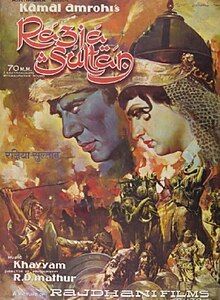Razia Sultan (film)
| Razia Sultan | |
|---|---|
 | |
| Directed by | Kamal Amrohi |
| Written by | Kamal Amrohi |
| Produced by | A.K. Misra |
| Starring | Hema Malini Dharmendra Parveen Babi |
| Cinematography | R. D. Mathur |
| Edited by | B. S. Glaad |
| Music by | Khayyam Kaifi Azmi (lyrics) |
Release date |
|
| Language | Hindustani (Hindi-Urdu )[1] |
| Budget | ₹7–10 crore[2] |
| Box office | ₹2 crore[2] |
Razia Sultan is a 1983 Indian period biographical film, written and directed by Kamal Amrohi, and starring Hema Malini, Parveen Babi and Dharmendra in lead roles. Upon release, it was a box office disaster, mainly due to its high production value.[3][1] It was the most expensive Indian film[broken anchor] made until then.
N.B. Kulkarni won the Filmfare Award for Best Art Direction, the only win for the film. Khayyam received a Filmfare nomination for Best Music Director. Lyrics were by Jan Nisar Akhtar and two songs picturized on Dharmendra as Yakut Jamaluddin, Abyssinian slave by Nida Fazli; one song by Kaifi Azmi; both walked into the project when Akhtar died. Some songs were sung by Lata Mangeshkar, including "Aye Dil-e Nadaan". Kamal Amrohi shot some scenes of Razia Sultan in Tonk between 1981-82.
Plot
[edit]The film is based on the life of Razia Sultan (1205–1240), the only female Sultan of Delhi (1236–1240) and her speculated love affair with the Abyssinian slave, Jamal-ud-Din Yakut.
Cast
[edit]- Hema Malini as Razia Sultan[1]
- Dharmendra as Yakut Jamaluddin, Abyssinian slave[1]
- Vijayendra Ghatge as Amil Altunia
- Parveen Babi as Khakun[1]
- Pradeep Kumar as Sultan Altamash[1]
- Ajit as Amil Balban
- Veena as Empress Shah Turkhan
- Sohrab Modi as Vazir-e-Azam[1]
- Dolly Jena
Soundtrack
[edit]It was the second time that Khayyam worked for a Kamal Amrohi's film. Earlier he had given music for Shankar Hussain, a movie produced by Amrohi. There is a story as to how Kamal got liking for Khayyam's music. Once Kamal Amrohi and his wife Meena Kumari liked a song that they had listened to on the radio. The song was "Parbaton Ke Pedon Par" and was sung by Mohammed Rafi and Suman Kalyanpur. Later on, they learned that this song was composed by Khayyam for a movie called Shagoon (1964). However, by the time Razia Sultan went on the shooting floors, Laxmikant–Pyarelal became the most-sought-after music director duo. So, Kamal Amrohi signed them. But, he did not like one fast-paced tune composed by the duo for the film and told them to compose a new tune instead. When Kamal went to the duo's place to listen to their new tune, he was asked to wait as the music directors were in a meeting. Feeling insulted that he was asked to wait by someone so junior to him, Kamal Amrohi replaced them with Khayyam.
| Sl.No | Title | Singer(s) |
|---|---|---|
| 1 | "Khwaab Ban Kar Koi Aayega" | Lata Mangeshkar |
| 2 | "Jalta Hai Badan" | |
| 3 | "Aye Dil-E-Nadaan" | |
| 4 | "Tera Hijr Mera Naseeb Hai" | Kabban Mirza |
| 5 | "Aayee Zanjeer Ki Jhaankar" | |
| 6 | "Aye Khuda Shukr Tera" | Mahendra Kapoor, Bhupinder Singh |
| 7 | "Shubh Ghadi Aayee Re" | Parveen Sultana, Jagjit Kaur, Sulakshana Pandit Ustad Fayyaz Ahmed Khan, Niyaz Ahmed Khan, Mohammed Dilshad Khan |
| 8 | "Hariyala Banna Aaya Re" | Jagjit Kaur, Asha Bhosle, Chorus |
Box office
[edit]Being director Kamal Amrohi's dream project, it was made in a very grand way. The film had an estimated budget of ₹7–10 crore in 1983, with production spanning over 7 years. When released, the film made barely ₹2 crore, becoming a box office disaster. [2][4]
Awards
[edit]Won
- Best Art Direction – N. B. Kulkarni
Nominated
References
[edit]- ^ a b c d e f g "Razia Sultan (1983 film)". Complete Index To World Film (CITWF) website. Archived from the original on 16 March 2016. Retrieved 10 October 2023.
- ^ a b c Jha, Lata (28 September 2015). "Ten big-budget Bollywood box-office disasters". Mint (newspaper). Retrieved 10 October 2023.
- ^ Nandini Ramnath (6 November 2017). "Picture the song: Is that really a lesbian moment in 'Khwab Bankar Koi Aayega' from 'Razia Sultan'?". scroll.in website. Retrieved 10 October 2023.
- ^ Kapoor, Sunil Sethi Coomi (17 July 2013). "Kamal Amrohi's dream film Razia Sultan bombs at the box-office". India Today. Retrieved 21 May 2020.
Further reading
[edit]- Singh, Jaspal (2008). "African Indians in Bollywood: Kamal Amrohi's Razia Sultan". In Hawley, John C. (ed.). India in Africa, Africa in India: Indian Ocean Cosmopolitanisms. Indiana University Press. pp. 273–288. ISBN 978-0-253-35121-0.
- Mukhopadhyay, Urvi (2014). "Imagining the powerful 'other': Representations of Razia Sultan". In Dimitrova, Diana (ed.). The Other in South Asian Religion, Literature and Film: Perspectives on otherism and otherness. Routledge. pp. 103–115. ISBN 978-1-315-85864-7.
External links
[edit]- Razia Sultan at IMDb
- 1983 films
- 1980s biographical drama films
- 1980s Hindi-language films
- 1983 drama films
- Films set in the 13th century
- History of India on film
- Indian biographical drama films
- Indian epic films
- Films set in Delhi
- Films about women in India
- Films scored by Mohammed Zahur Khayyam
- Historical epic films
- Indian historical drama films
- 1980s historical drama films
- 1980s Urdu-language films
- Cultural depictions of Razia Sultan
- Films directed by Kamal Amrohi
- Urdu-language Indian films
- Filmfare Awards winners
- Historical film stubs
- 1980s Hindi-language film stubs
